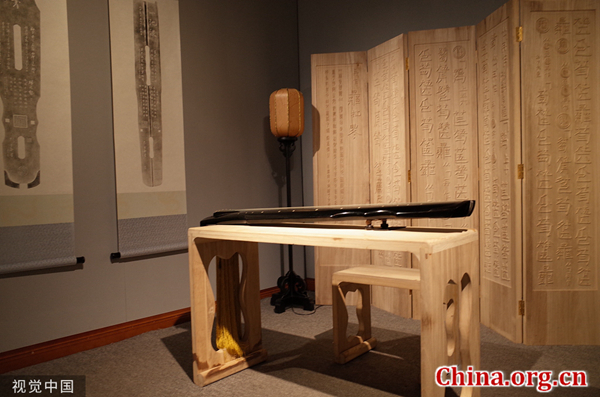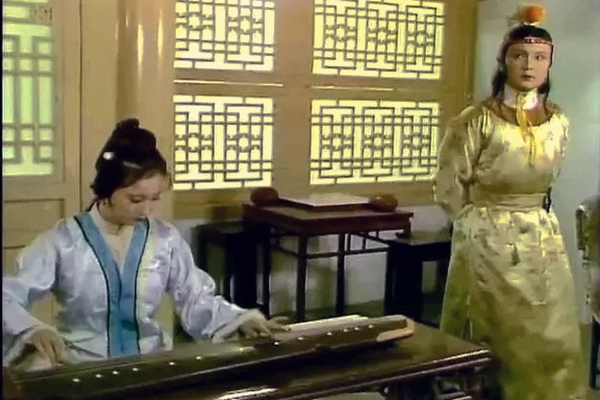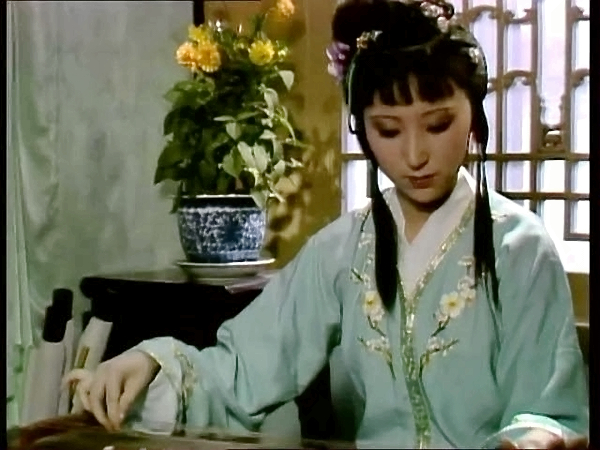《红楼梦》英译品读(十六)
作者:王晓辉

琴棋书画,并称“文人四艺”,而琴居其首。“琴”在这里特指古琴,亦称“七弦琴”,距今已有三千多年的历史。《琴操》中有“伏羲作琴”的记载,据说伏羲创制的琴只有一根弦,后舜改为五弦,周文王增一弦,到了武王伐纣时,又增一弦为七弦,始成定制。我们今天看到的古琴就是七弦琴。
关于古代帝王制琴的记载,未必尽是史实。当帝王的,既要让老百姓吃饱肚子,又要防御外敌入侵,还要发动战争统一天下,哪来的时间钻研古琴?多半是后世假托他们的名义罢了,但这些记载和传说至少从一个角度说明了古琴源远流长的历史。
可以肯定的是,到了周朝,古琴已经成为民间非常流行的乐器。《诗经》中有关琴的诗句比比皆是。“窈窕淑女,琴瑟友之(《诗经·国风·关雎》);我有嘉宾,鼓瑟鼓琴(《诗经·小雅·鹿鸣》);琴瑟在御,莫不静好(《诗经·郑风·女曰鸡鸣》)……可见,古琴已经走进日常生活,成为人们表达爱慕、招待宾客、抒发情感的艺术形式。

古琴音域宽广,音色深沉,余音悠长,其清、和、淡、雅的音乐品质,最适合寄托文人超凡脱俗的处事心态,千百年来,一直是读书人和士大夫修身养性、抒发情怀的音乐形式,也因此被赋予了深厚的文化内涵。
与古琴相关的典故有很多:俞伯牙和钟子期高山流水遇知音;嵇康刑场抚琴,一曲《广陵散》,遂成千古绝唱;诸葛亮巧施空城计,弹琴退敌……带琴字的成语更是不胜枚举,琴瑟和鸣、如鼓琴瑟、琴剑飘零、对牛弹琴、焚琴煮鹤……足见琴在人们日常生活中的地位。
《红楼梦》描写的是封建社会大家族的生活,自然少不了琴。第八十六回,宝玉到潇湘馆去看林黛玉,见她正在看一本书,书上的字一个也不认得。有的像“芍”字,有的像“茫”字;也有一个“大”字旁边“九”字加上一勾,中间又添个“五”字;也有上头“五”字“六”字又添一个“木”字,底下又是一个“五”字。原来,黛玉正在看一本琴谱。

贾宝玉不懂琴谱,却对上面像汉字又不是汉字的“天书”很感兴趣,非要林黛玉教他不可。黛玉道:“不用教的,一说便可以知道的。”宝玉道:“我是个糊涂人,得教我那个‘大’字加一勾,中间一个‘五’字的。”黛玉笑道:“这‘大’字‘九’字是用左手大拇指按琴上的‘九徽’,这一勾加‘五’字是右手钩‘五弦’,并不是一个字,乃是一声,是极容易的。”
别看林黛玉说得轻描淡写,其实古琴特别讲究,不论是琴谱还是弹奏手法都非常复杂。这段文字并不长,却不好理解,翻译起来就更难了。
闵福德的译文:
Baoyu was completely carried away:
"Oh, coz! How wonderful it all sounds! But I am afraid I still don't understand these peculiar characters. Please teach me how to read some of them."
"I don't need to teach you. It's easy."
"But I am such a fool! Please help me! Take that one there—all I can make out is Hook, with Big on top and Five in the middle."
Dai-yu laughed at him.
"The Big and Nine on top mean you stop the string with the thumb of your left hand at the ninth fret. The Hook and Five mean you hook the middle finger of your right hand slightly and pull the fifth string towards you. So you see, it is not what we would call a character, it's more a cluster of signs telling you what the next note is and how to play it. It's very easy..."

古琴的弹奏是左手按琴弦,右手弹琴,琴身外侧有十三个镶嵌的标志,叫做“徽”,是定音的标志。闵福德用“the ninth fret”来翻译“九徽”,十分恰当。“fret”的意思是琴格,也叫音品(牛津字典的解释是one of the bars on the long thin part of a guitar, etc. Frets show you where to press the strings with your fingers to produce particular sounds.)。这一段最难处理的是最后一句,“并不是一个字,乃是一声”。如果翻译成It is not a character, but a sound (或note),就偏离原意了,因为原文说得很清楚,那不是一个字,而是几个字组合在一起,表示左手按弦的位置和右手弹奏的位置和手法,如此这般才能弹奏出所要的琴音。闵福德将这句看似简单实则复杂的话详细地解释出来,告诉外国读者,那不是一个字,而是一堆符号,告诉你是什么音高,如何弹奏(a cluster of signs telling you what the next note is and how to play it)。为了突出黛玉耐心解释的口吻,闵福德还用了“so you see, it is not what we would call a character, it is more...”,用聊天的语气,让对话娓娓道来,场景如在眼前。
林黛玉的一番解释让宝玉喜不自胜,也想跟着学琴,谁知林黛玉下面的一段话却给他浇了一盆冷水。

黛玉道:“琴者,禁也。古人制下,原以治身,涵养性情,抑其淫荡,去其奢侈。若要抚琴,必择静室高斋,或在层楼的上头,在林石的里面,或是山巅上,或是水涯上。再遇着那天地清和的时候,风清月朗,焚香静坐,心不外想,气血和平,才能与神合灵,与道合妙。所以古人说‘知音难遇。’若无知音,宁可独对着那清风明月,苍松怪石,野猿老鹤,抚弄一番,以寄兴趣,方为不负了这琴。还有一层,又要指法好,取音好。若必要抚琴,先须衣冠整齐,或鹤氅或深衣,要如古人的象表,那才能称圣人之器。然后盥了手,焚上香,方才将身就在榻边,把琴放在案上,坐在第五徽的地方儿,对着自己的当心,两手方从容抬起:这才心身俱正。还要知道轻重疾徐、卷舒自若、体态尊重方好。”宝玉道:“我们学着玩,若这么讲究起来,那就难了。”
林黛玉的这段话,简直就是一堂古琴艺术讲座,从琴的旨趣到心境,从抚琴的姿态到指法,说得头头是道。如此雅致的文字,深刻的道理,闵福德教授是如何转换成英文的呢?
"The essence of the Qin," replied Dai-yu, "is restraint. It was created in ancient times to help man purify himself and lead a gentle and sober life, to quell all wayward passions and to curb every riotous impulse. If you wish to play, then you must first seek out a quiet chamber, a studio with distant view, or upper room; or some secluded nook among rocks and trees, on craggy mountain-top, by water edge... Let the weather be clear and calm, a gentle breeze, a moon-lit night. Light some incense, and sit in silent meditation. Empty the mind of outward thoughts. Poise Breath and Blood in Perfect Harmony. Your Soul may now commune with the Divine, and enter into that mysterious Union with the Way.
"As the ancients said, true music-lover have always been few. If there is no one able to share your music's true delight, then sit alone, and serenade the breeze and moonlight, hymn the ancient pines and weather-worn rocks; let wild monkeys and venerable cranes hear your song, rather than the vulgar mob, whose dull ears would only sully the precious virtue of the Qin.
"So much for the setting. The next two essentials are finger-technique and touch. And before you think of playing, be sure to dress in a suitable style—perfectly in a swansdown cape or other antique robe. Assume the dignified manner of the ancients, a manner in keeping with the chosen instrument of the sages. Wash your hands. Light the incense. Sit on the edge of your couch. Place the Qin on the table before you, and sit with your chest opposite the fifth fret. Raise both hands slowly and gracefully. You are now ready, in body and mind, to begin.
"You must while playing observe carefully the dynamic markings—piano, forte, allegro, adagio—and maintain a relaxed but serious manner at all the times.
"Goodness me!" cried Bao-yu. "I was thinking we could do it for fun! If it's as complicated as that, I'm not sure I'd be up to it!"
第一句,“琴者,禁也”,语出南宋《琴议篇》,意思是琴的内涵是为了禁邪归正,以和人心。闵福德将这句话译为“The essence of the Qin is restraint”,很好地诠释了“琴者,禁也”文字背后的深意。林黛玉的第二句话,是对“琴者,禁也”的进一步解释。古人制琴,原为治身、养性、止淫、去奢,闵福德将这四种功能逐个译出:“It was created in ancient times to help man purify himself and lead a gentle and sober life, to quell all wayward passions and to curb every riotous impulse”。刚看到这句话,感觉闵福德的翻译有点长,就试着将“原以治身”和“涵养性情”合在一起译为to cultivate one’s mind and character,将“抑其淫荡”和“去其奢侈”合并译为to curb waywardness and extravagance。这样一来,字数少了很多,但却增加了waywardness和extravagance这样的抽象名词,语意反而变得模糊了。思来想去,还是闵福德厉害,不服不行。
接着,林黛玉又强调了抚琴时的心境:心不外想,血气平和,才能与神合灵,与道合妙。原文非常雅洁,所以译文也不能拖沓,心不外想—Empty the mind of outside thoughts—排除外部杂念;血气平和—Poise Breath and Blood in Perfect Harmony—平衡呼吸与血脉;与神合灵—Your Soul may now commune with the Divine—魂与神交;与道合妙—enter into that mysterious Union with the Way—与道合一。闵福德的译文不仅清晰准确,还有极强的节奏感,实属难得。
弹奏古琴,讲究坐姿身法,不能摇头晃脑,前仰后合,亦不可飞抚作势,态度轻薄。所以,林黛玉说要“将身就在榻边,把琴放在案上,坐在第五徽的地方儿,对着自己的当心,两手方从容抬起:这才心身俱正”。Sit on the edge of your couch. Place the Qin on the table before you, and sit with your chest opposite the fifth fret. Raise both hands slowly and gracefully. You are now ready, in body and mind, to begin.我觉得,这段话中最难翻译的,倒是貌似简单的“从容”二字。大部分词典(参见外研社的《汉英词典》)对“从容”的解释是calmly, unhurriedly, leisurely,但放在本句中均不妥帖。calmly指沉着冷静,unhurriedly指不急不迫,都是面对外部情况时的态度;leisurely虽然将就可用,但又偏于闲散,所以,闵福德非常巧妙地用了slowly and gracefully,于平淡无奇中显示出深厚的功力。
琴中有至理,琴中有真味。为人要有剑胆琴心,交友要鼓瑟鼓琴,过日子要琴瑟和鸣,生活中偶尔也会对牛弹琴,但最好不要乱弹琴,绝对不要煮鹤焚琴。
每次读《红楼梦》都会引发思考,有所体会,对照学习前辈大师的英文翻译,收获更多,正所谓琴音雅韵,乐在其中!
 0
0 







Go to Forum >>0 Comment(s)